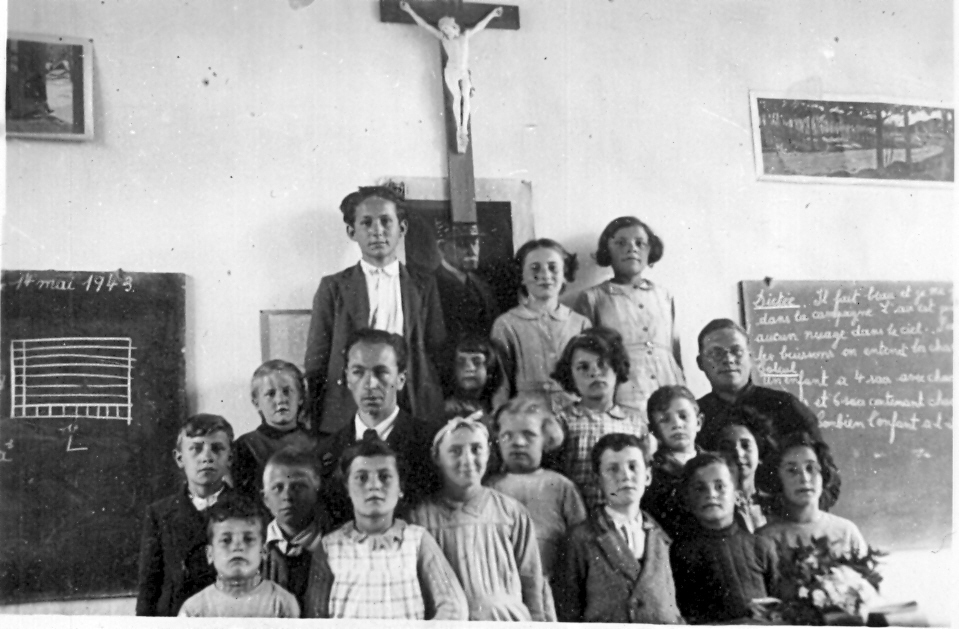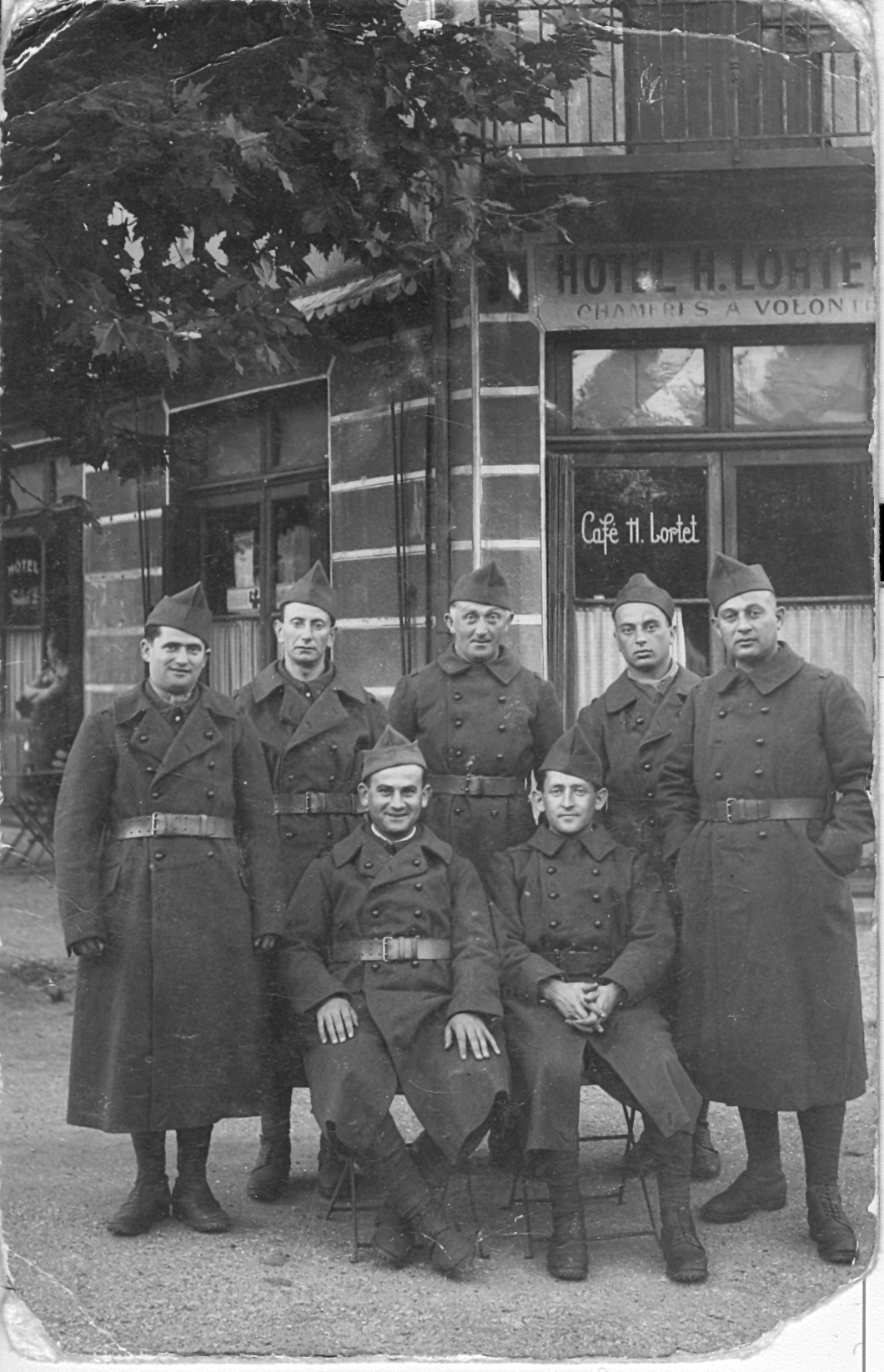Read the previous part of Solange’s story here, at Memories of the War: Sabine Solange Mantel née Hoch
We found ourselves in Compreignac (Haute-Vienne) along with several other Jewish families, the Nauciels and the Bakkus to name just a few, who were also in hiding. We lived in a single room with my cousin Jeannot Seibert whose mother had passed away, in Puy-En-Velay, in 1943. When my Aunt Fanny was ill, my cousin and I had been sent to Monastier-sous-Gazeilles where we stayed with Miss Pessemesse. Her family were involved in the Resistance. After Jeannot Seibert had come along, it all got a bit cramped and we found somewhere to live in a place called Le Lac, near Compreignac.

Compreignac May 1943; the class of children from Alsace with their teacher M.Cordary and the local priest. Solange is second row, first on right partially obscured by child in the front row.
Compreignac was also home to a lot of non-Jewish families from Alsace and Lorraine who had come to take refuge there and who stayed there until the end of the war. All the children from Alsace and Lorraine were put together in one class. Our primary school teacher was called Mr Cordary and he came from Lorraine. The local vicar was from Lorraine as well. I have stayed in contact with Mrs Cordary to this very day.
One market day in 1943, my mother and I went to Limoges. In the Place des Bancs, my mother encountered a Jewish gentleman she knew who was carrying two jerrycans full of oil – probably for the black market. Whilst we were chatting, two German officers passed by and the man saluted them. My mother immediately grabbed me by the hand and we disappeared into the crowd. She took me to the private school: “La Divine Providence” which was run by nuns. I only stayed here briefly; my father was afraid that the nuns might convert me and so my parents came to take me home.

A Group of Alsatian Jews in the Foreign Legion. Solange’s father is standing second from the left. The soldier seated on the right is Weinberg who was executed by the Resistance at the end of the war.
After the war we learned that the man we had met that day had really been a collaborator and during the Liberation, as part of the purges, members of the Resistance forced him to dig his own grave and he was killed. In spite of the fact that the man collaborated with the Germans, his wife and children were deported and never came back.
My parents lived every day with fear in their hearts. They were afraid they would be denounced as Jews, because they didn’t know who was doing what. People didn’t trust one another.
One day in 1943, my Aunt, Carola Hoch, came to visit. She was a widow from Thionville. She and her son, Willy (born 1919), had taken refuge in Bugeat en Corrèze after he had returned from obligatory youth service in the “chantiers de jeunesse”. Her other son, Eddy, was a prisoner in a “Stalag” prisoner of war camp in Sagan, Poland. My parents used to send packages to Eddy.The “gendarmes” came to our house and asked for her papers. They had followed her there. Shortly after, she was arrested and deported (1). Willy stayed with the Bannette family in Pérols-sur-Vézere. He later married their daughter, Georgette. After the War Willy and Georgette moved to Thionville and, later, Metz.
My father worked as a labourer on a farm 5km away and he walked there every day. He tried not to talk too much because of his foreign accent. His boss gave him a few furrows for his own personal use. This gave us a way of feeding ourselves and we were able to send potatoes and Swedes to our friends.One day my father was asked by the Maquis to organise their food supplies. To do this, he collected goods from local traders, such as Mrs Cordary’s parents, who owned a grocery shop.
One morning in June 1944, Mr Cordary arrived at school in a very perky mood and told us: “Children, go home; The Americans have landed in France”. That was D-Day. The news spread very quickly because, in the evenings, we used to walk to a friend’s house in the village and listen to Radio London on the wireless.
One morning in 1944, around five in the morning, my parents woke me and Jeannot up. They wanted us to hide, because they had heard the sound of German soldiers passing by outside. Later on we saw, in the distance, flames coming from a village up on the hill. It was Oradour-sur-Glâne. I’ll never forget the sight of it. My mother went to the farms and taught people how to make pasta and soap. She taught them to dye fabrics as well. In return they gave her flour and produce. My parents used to collect acorns from the forest, close to the lake, and fill jute sacks with them. Then, they would leave them there. They probably used the acorns to bulk out the wheat flour. Once the region was liberated, my father went to Limoges and worked for a coil-winding company, “Repelec”.
After the Liberation of Colmar, we went back and rebuilt our lives.
Interview conducted 6th August by Daniel Fuks.
Transcribed in French
Translated into English by Rob McNeill
(1) Carola Hoch was sent to Auschwitz on the 19.04.1944 in the 72nd convoy
Comment on the story here.
